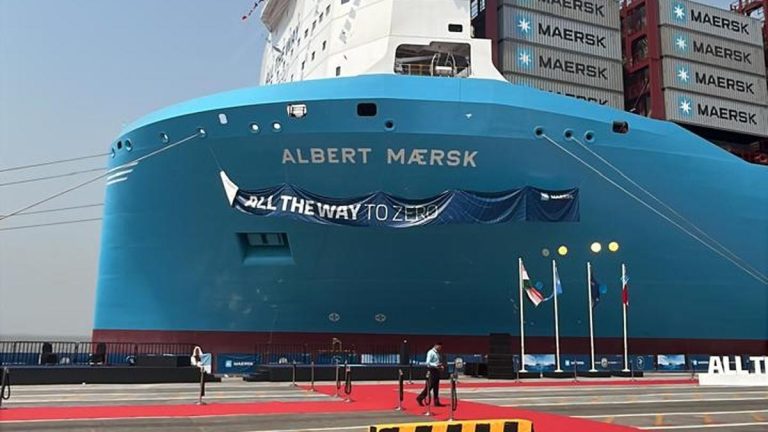
In the backdrop of the name-giving ceremony, Maersk announced that it would invest about $5 billion in ports and terminals as well as landside infrastructure development in India.
| Photo Credit: Special Arrangement
A.P. Moller – Maersk (Maersk) on Friday organised the name-giving ceremony of its newest dual-fuel methanol container vessel at APM Terminal, Jawaharlal Nehru Port Authority (JNPA) in Mumbai reiterating its commitment to India.
The vessel, named Albert Maersk, is the eleventh vessel in Maersk’s fleet capable of operating on methanol, the green fuel as part of it’s commitment to go net zero by 2040.
At a traditional name-giving ceremony, Union Minister Raksha Khadse turned godmother for the vessel which was on it’s maiden voyage to India.
“Maersk continues to take firm steps towards decarbonising shipping with the addition of one more dual-fuel vessel to its fleet”, said Vincent Clerc, CEO, A.P. Moller – Maersk.
“India is among the world’s fastest-growing major economies and Maersk looks forward to partnering with India on various aspects, such as exploring the potential sourcing of alternative fuels for low-emissions shipping and activities involving ship repairs and shipbuilding in the future that align well with the Indian Government’s ambitions to promote the shipping sector,” he said.
Speaking on the occasion Union Shipping & Ports Minister Sarbananda Sonowal said, “With the demand for green vessels rising, India has the potential to become a major producer and supplier of green methanol, ammonia, and hydrogen-based fuels.”
“Maersk’s decision to focus on green fuel production in India is a welcome step that will accelerate our journey towards a sustainable maritime future. This vessel naming is more than just a tradition—it is a symbol of trust, collaboration, and a shared vision for the future,” he added.
In the backdrop of the name-giving ceremony, Maersk announced that it would invest about $5 billion in ports and terminals as well as landside infrastructure development in India.
Keith Svendsen, CEO, APM Terminals, said, “We believe we can play a role in reducing the cost of logistics by ensuring that our customers access all their supply chain needs in one place – from all modes of transportation to port handling to warehousing and distribution,” he said.
“As APM Terminals, we are ready to invest more in developing ports with low emissions and great efficiency that will help businesses grow and connect India with the global markets,” he added.
‘Albert Maersk’ is part of a series of 18 large dual-fuel methanol vessels scheduled for delivery in 2024 and 2025. Built at Hyundai Heavy Industries in Ulsan, South Korea, she can carry 16,592 standard containers (TEU).
Bio- and e-methanol can reduce GHG emissions by at least 65% compared to conventional fossil fuels such as bunker oil (depending on the feedstock and production process of the methanol, calculated on a life cycle basis), the company said.
With the vessel technologies available, Maersk has been urging the International Maritime Organisation (IMO) member states to adopt strong regulations to push the industry forward towards its climate targets.
“Maersk believes it is critically important that IMO regulation is fuel-agnostic, allowing for a multi-fuel future for shipping as well as making the low-emission transport choice viable and competitive by closing the price gap between fossil and alternative fuels,” the company said.
Published – February 28, 2025 09:12 pm IST

